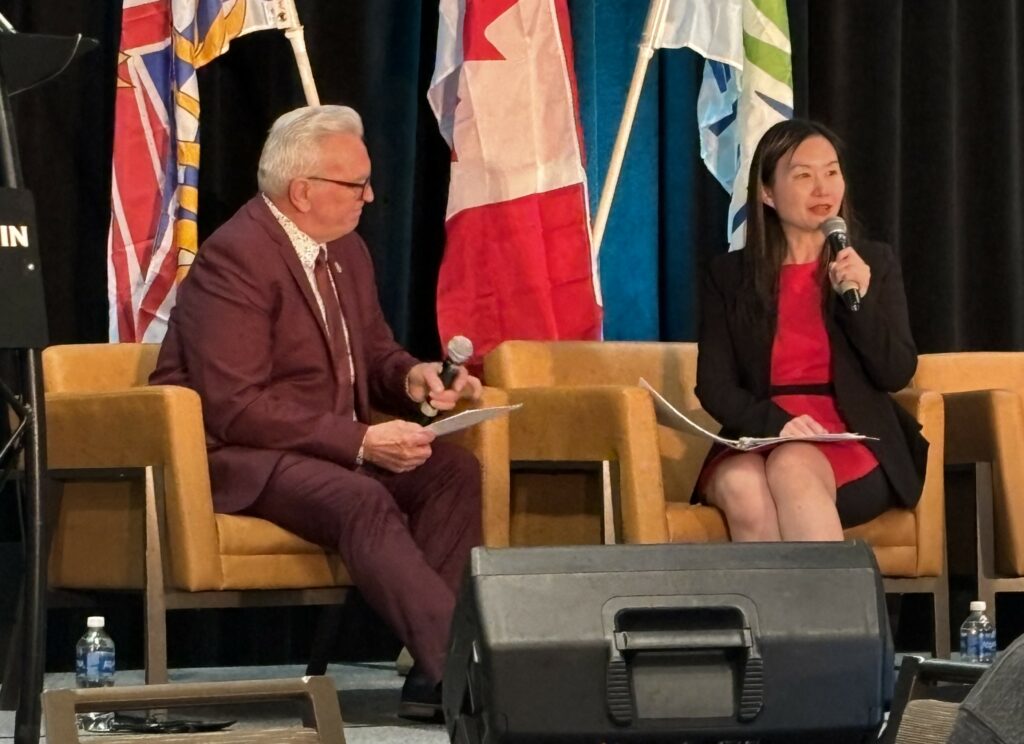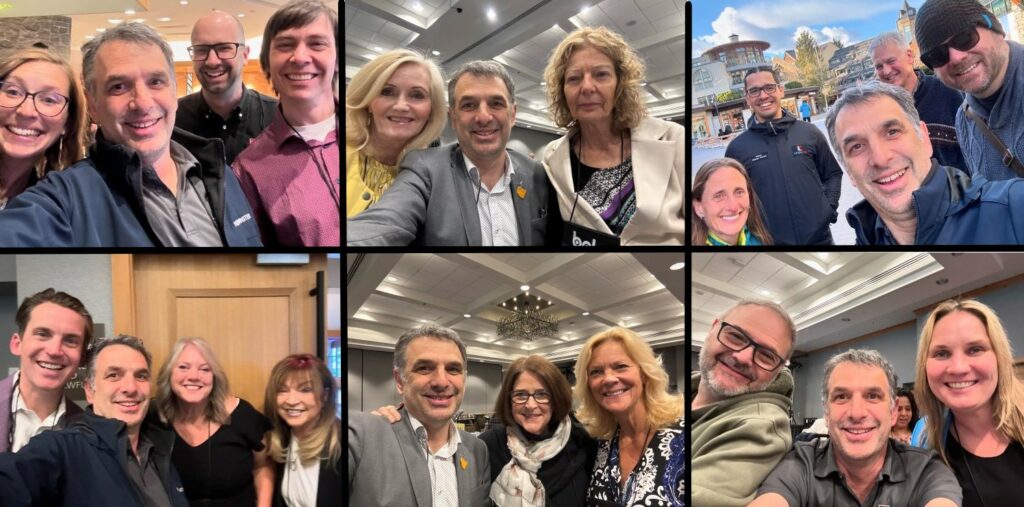Last week was the Lower Mainland LGA annual conference and AGM. This is the annual convention of local government elected folks from all of the municipalities and regional districts from Pemberton to White Rock and Hope to Bowen Island. As I have done in previous years (here, here, here, etc…), I like to provide a bit of a summary of what happened at the conference. Over in my Newsletter I provided a bit more behind-the-curtain stuff for those who want to read that kind of stuff, all you need to do is register here to get the juice directly into your mailbox every Wednesday.
The LMLGA has three main public-might-be-interested parts. We have a Resolutions Session where we agree as a group on areas of senior government advocacy, Panels/workshops where we share strategies and challenges around emergent local government issues, and political speeches from provincial folks. Maybe I’ll talk them in reverse order here.
Unlike previous years, the Senior Government sessions were structured as Q&A sessions moderated by members of the LMLGA Executive, instead of stand-alone speeches. I appreciated this change, especially as it is an election year, and we didn’t want to hear stump speeches, we wanted to hear their party’s approach to issues that matter to our members.

Like previous years, Sonia Furstenau seemed to connect best to the audience. She worked in Local Government, but also has that third-party opportunity to speak truth about power (something I frankly think the Federal NDP could do more of). One favourite (paraphrased) quote: “You don’t run for MLA with the greens if power is your motivating goal.” A policy wonk after my own heart, she spoke to the flaws in the current Carbon Tax regime, issues with the Water Sustainability Act, and the dismal state of the current political discourse, which is eroding much of the ability to get the actual work of governing done.
Also like previous years, Kevin Falcon sometimes missed the mark in ingratiating himself to the crowd in the room. Local government elected trying to get housing built don’t need to be told “bureaucrats” are the problem, or that his experience as a for-profit developer is all BC Housing needs to fulfill our affordable housing needs while suggesting taxes are the reason the $400k townhouses he built in Surrey are now selling for $1M. He also, unknowingly I suspect, countered Fursteneau’s message around public discourse by suggesting “Decorum is great when you are in government, not great when you are in opposition”, following up with a passionate defense of fearmongering as political rhetoric. Meanwhile, there was no representative from the BC Conservative Party at the conference, so I guess he owned that space.

Anne Kang spoke of the work she did over the last year-and-a-bit as Minister of Local Government, including extensive touring around the province to meet with as many leaders of local governments as possible, and her championing for the turning over $1 Billion of infrastructure money directly to Local Governments through the Growing Communities Fund. She also emphasized the increased support her government is providing to Libraries across the Province. She spoke to challenges she hears from local government on the overlapping homelessness, poisoned drug, and mental health crises, though didn’t really get into the discussion about new legislation coming from the Ministry of Housing that is challenging many communities. She was light on new promises (with two more weeks in this session and an election pending), but was clearly very engaged and informed about the issues Local Governments are facing.

There were several Panels this year, but I found the first one the most interesting. The topic was “Public Safety Challenges in Public Spaces”, and I can imagine the direction of the panels shifted several times over the last few weeks, as the conversation province-wide around decriminalization has evolved. The panels was deftly (and very entertainingly) moderated by Andrea Derban from the Community Action Initiative. Her framing of the challenge really set the discussion up: we are at the Moral Panic phase and need leaders to push past that; This is not an OD crisis, it is a toxic drug supply crisis and there are material differences; the data is crystal clear that safe supply is not causing deaths; the people who are dying are not who you first think, and that flawed assumption is in the way of us saving lives.
The panelists included a police member from Abbotsford talking about their revised approaches to addressing mental health and addictions issues as health issues, not criminal ones, and collaboration with businesses being impacted by people seeking shelter. A Fire Chief from Surrey talked about their Second Responder program (which I wrote about New West adopting here) and signs of its success. Councillor Nadine Nakagawa spoke of our Three Crises Response Pilot and other work the City of New Westminster is doing. My phone lit up when she was speaking about it with texted questions from our colleagues about the Pilot, from how we paid for it to how we are measuring outcomes.
There were some take-aways around the need to collect data on measures we are taking – New West again providing the example of our Second Responder and Pilot Project both include collaboration with academics to measure outcomes). But it was Andrea who told us we need to tell better stories (“compassionate, evidence based, action-oriented”) about who is being impacted, and what success looks like.

The resolutions session is where resolutions from member jurisdictions are put before the membership for support. If endorsed, they effectively call on senior government for anything from policy changes to financial support for various causes. This year there were 60 Resolutions considered (you can read them all here), including the following 6 submitted by New Westminster:
R3- Additional Funding for Overdose Prevention Sites:“…be it resolved that UBCM ask the Province of British Columbia to increase funding for Health Authorities to augment existing, and to open new, supervised consumption and overdose prevention sites, including related inhalation services, across British Columbia and including local governments which do not currently offer this service to residents”.
This was endorsed by the LMLGA executive, and then endorsed by the membership On Consent. This is actually a pretty significant and clear message to the province that the municipalities of the Lower Mainland want to see harm reduction in every community.
R4 – Eliminating Barriers to Publicly-Owned and -Operated Home Care Services and Long-Term Care: “…be it resolved that UBCM ask the Province to eliminate financial and accessibility barriers by investing in more publicly owned and operated and not-for-profit home care services and social supports required to age in place, and by further investing in publicly owned and operated and not-for-profit long-term care to ensure seniors are well supported in the continuum of care.”
This resolution was endorsed by the executive, but was pulled from consent to facilitate an attempt by some members to amend it to also call for more public funding for for-profit care providers, which was wisely defeated when folks argued effectively that the intent of the motion was to build capacity in the public provision of seniors care, as the Seniors Advocate is asking for. The main motion was then supported by membership.
R11- EComm Governance Review: “…be it resolved that UBCM ask the provincial government to engage local governments in a comprehensive review of the governance structure and delivery model of 911 emergency call taking, related non-emergency call taking, and emergency dispatch services across BC with a goal to assure reliable, affordable, and sustainable services for all communities”.
This was also endorsed by the LMLGA executive, and then endorsed by the membership On Consent. It’s clear that much of the province is frustrated by escalating EComm costs and continued failure to meet the expectations of the community. The clear support for this motion is perhaps a bit surprising because EComm currently belongs to Local Governments, and this could be interpreted as us asking the Province to step in and take the management of it over – to upload the problem.
R34 – Creating Safer Streets for Everyone with Intersection Safety Cameras: “…be it resolved that LMLGA and UBCM call on the provincial government to expand the implementation of speed and red light intersection safety cameras in local governments across BC, prioritizing intersections near schools and those with a high rate of crashes that result in injuries or fatalities as identified by ICBC, and that the provincial government provide all revenue from additional speed and red light cameras to local governments as grants to be invested in implementing local and safety improvements;
And be it further resolved that the LMLGA and UBCM request that the provincial government allow BC local governments to install speed and red light cameras at their own cost and set and collect fees directly to be earmarked for road safety improvements”.
This motion was debated well by the members, as was a similar one from the City of North Vancouver that didn’t include the mention of school areas. It was supported by a healthy majority of the members, which reflects the current public opinion about speed and intersection cameras – the majority support them.
R48 – Allowing Local Governments to Apply Commercial Rent Controls: “…be it resolved that UBCM ask the Province of British Columbia to provide local governments with the legislative authority to enable special economic zones where commercial rent control and demo/renoviction policies could be applied to ensure predictability in commercial lease costs, so local small businesses and community-serving commercial tenants can continue to serve their communities”.
This motion was also well debated by members, after being motivated by Councillor Henderson. In the end it was supported by a thin majority of the members. I might expect this one will not do as well at UBCM, but that is some advocacy work we need to do.
R56 – Creating a Ministry of Hospitality: “…be it resolved that UBCM ask the Province to create a Ministry of Hospitality to support and engage restaurants, food service vendors and the hospitality sector generally by acting as advocates within government for policy development and reform”
This motion arose out of advocacy from the BC Food Service Association’s “Save BC Restaurants” campaign, and lead to an interesting debate, but was ultimately defeated by a slim majority.
One more bit of voting news was that Ruby Campbell was elected as a Director at Large of the Lower Mainland LGA. This continues the tradition of Lorrie Williams, Chuck Puchmayr, and myself in representing New Westminster on that executive.

Finally a major part of this, like any conference, is the opportunity to network with leaders from around the region. We can laugh about our horror stories with the only cohort who really understands, learn from each other by sharing successes and challenges, and remind each other that we aren’t alone in this work. As it seems the media is filled by stories indicating (to quote my friend Mary) “we are not always sending our best”, it is great to connect with some of the most dedicated, serious, and accomplished people doing this work for all the right reasons.
